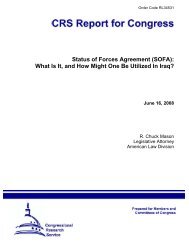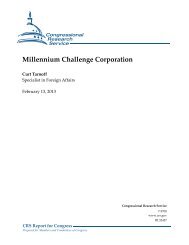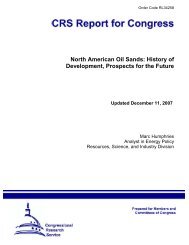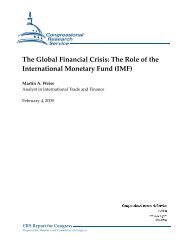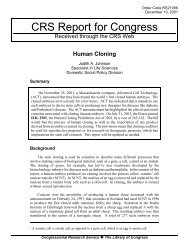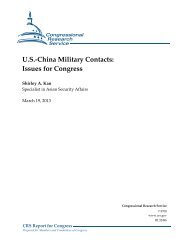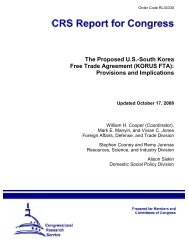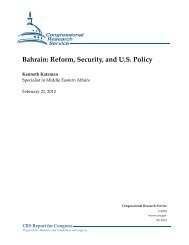Iran Sanctions - Foreign Press Centers
Iran Sanctions - Foreign Press Centers
Iran Sanctions - Foreign Press Centers
You also want an ePaper? Increase the reach of your titles
YUMPU automatically turns print PDFs into web optimized ePapers that Google loves.
so the damage to the merchant community from international sanctions has been<br />
considerable. Further effects are likely in light of the EU’s freeze on the assets of<br />
Tidewater Middle East Company in January 2012; the firm operates many of<br />
<strong>Iran</strong>’s ports and ports in neighboring countries that service ships headed to <strong>Iran</strong>.<br />
<strong>Foreign</strong> Companies Exiting the <strong>Iran</strong> Market<br />
<strong>Iran</strong> <strong>Sanctions</strong><br />
The sanctions have caused <strong>Iran</strong> to be viewed by international firms as “radioactive,” causing<br />
many international firms to exit the <strong>Iran</strong>ian market even if doing so is not required by any<br />
sanction. Neither the U.S. ban on trade and investment with <strong>Iran</strong>, nor U.N. sanctions, nor<br />
European Union sanctions on <strong>Iran</strong>, ban trade with <strong>Iran</strong> in all civilian goods. Many experts believe<br />
that, over time, the efficiency and output of <strong>Iran</strong>’s economy will decline as foreign expertise<br />
departs and <strong>Iran</strong> attracts alternative investment from or imports goods from less capable foreign<br />
companies. Examples of major non-U.S. companies discontinuing business with <strong>Iran</strong> include the<br />
following:<br />
• ABB of Switzerland said in January 2010 it would cease doing business with<br />
<strong>Iran</strong>.<br />
• Siemens of Germany was active in the <strong>Iran</strong> telecommunications infrastructure<br />
market, but announced in February 2010 that it would cease pursuing business in<br />
<strong>Iran</strong>. Finemeccanica, a defense and transportation conglomerate of Italy, followed<br />
suit, as did Thyssen-Krupp, a German steelmaker.<br />
• Germany’s Daimler (Mercedes-Benz maker) said in April 2010 it would freeze<br />
planned exports to <strong>Iran</strong> of cars and trucks.<br />
• In August-September 2010, Japan and South Korea announced that their<br />
automakers Toyota, Hyundai, and Kia Motors would cease selling automobiles to<br />
<strong>Iran</strong>.<br />
• Attorneys for BNP Paribas of France told the author in July 2011 that, as of 2007,<br />
the firm was pursuing no new business in <strong>Iran</strong>, although it was fulfilling existing<br />
obligations in that market.<br />
• On June 30, 2011, according to press reports, the Danish shipping giant Maersk<br />
told <strong>Iran</strong> that it would no longer operate out of <strong>Iran</strong>’s three largest ports. The<br />
firm’s decision reportedly was based on the U.S. announcement on June 23,<br />
2011, that it was sanctioning the operator of those ports, Tidewater Middle East<br />
Co., as a proliferation entity under Executive Order 13382. The pullout of<br />
Maersk will likely further raise shipping costs.<br />
• The State Department reported on September 30, 2010, that Hong Kong company<br />
NYK Line Ltd. had ended shipping business with <strong>Iran</strong> (on any goods).<br />
• Persuading oil services firms to exit <strong>Iran</strong> was the intent of Executive Order 13590<br />
of November 21, 2011, which makes such activity sanctionable. Well before the<br />
order was issued, one large oil services firm Schlumberger, which in incorporated<br />
in the Netherlands Antilles, said it will wind down its business with <strong>Iran</strong>.<br />
Congressional Research Service 45



